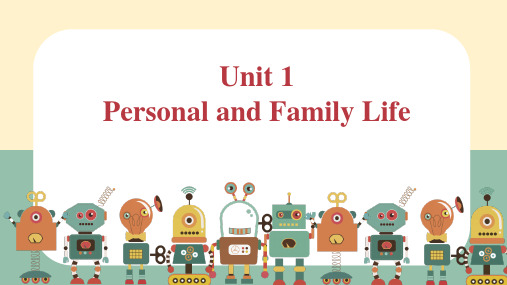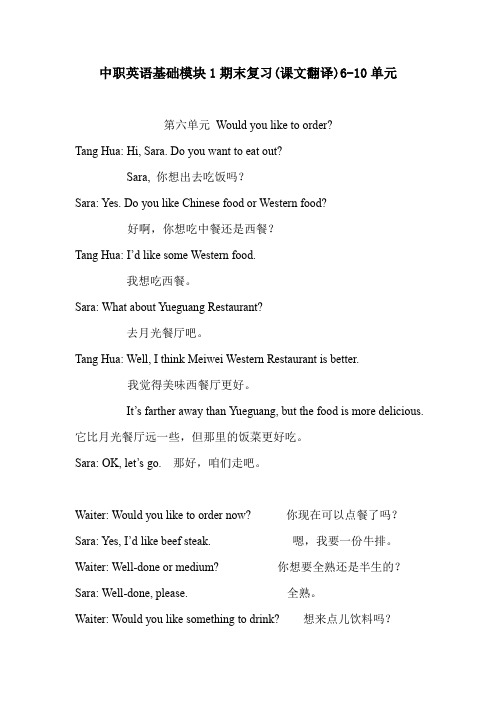中职英语(基础模块)1生活与文化原文及翻译
- 格式:docx
- 大小:20.08 KB
- 文档页数:6




中职英语基础模块1期末复习(课文翻译)6-10单元第六单元Would you like to order?Tang Hua: Hi, Sara. Do you want to eat out?Sara, 你想出去吃饭吗?Sara: Yes. Do you like Chinese food or Western food?好啊,你想吃中餐还是西餐?Tang Hua: I’d like some Western food.我想吃西餐。
Sara: What about Y ueguang Restaurant?去月光餐厅吧。
Tang Hua: Well, I think Meiwei Western Restaurant is better.我觉得美味西餐厅更好。
It’s farther away than Yueguang, but the food is more delicious. 它比月光餐厅远一些,但那里的饭菜更好吃。
Sara: OK, let’s go.那好,咱们走吧。
Waiter: Would you like to order now? 你现在可以点餐了吗?Sara: Yes, I’d like beef steak.嗯,我要一份牛排。
Waiter: Well-done or medium? 你想要全熟还是半生的?Sara: Well-done, please. 全熟。
Waiter: Would you like something to drink? 想来点儿饮料吗?Sara: A glass of orange juice, please. 请给我来一杯橙汁。
Waiter: Beef steak well-done and a glass of orange juice.全熟的牛排和一杯橙汁,对吗?Sara: Right. 是的。
Waiter: What about you, Miss? 小姐,您呢?Tang Hua: The same, please. 和她点的一样。


高教版中职英语(基础模块第1册)介绍《高教版中职英语(基础模块第1册)》是中国高等教育出版社出版的一本针对中职教育领域的英语教材。
本教材旨在帮助中职学生打下坚实的英语基础,提供基本的英语词汇和语法知识,并培养他们的听、说、读、写的能力。
特点1.系统性学习:本教材按照学习者的认知规律,从基础开始逐步深入。
从字母、单词到句子和对话,层层深入,循序渐进。
2.综合性教学:本教材将听、说、读、写的技能融入到每个单元中,通过各种有趣的活动和练习,激发学生的兴趣和参与度。
3.实用性教学:本教材注重培养学生的实际应用能力,通过丰富的听力材料和实用的语言示例,帮助学生掌握日常生活中常用的英语表达方式。
内容概述本教材共分为8个单元,每个单元涵盖以下内容:单元1:字母与发音•学习英语26个字母及其发音规则•练习正确发音•分辨字母大小写单元2:数字与数量•学习基本数字及其用法•表达时间、年龄、日期等数量单元3:个人信息•学习表达个人信息,如姓名、年龄、国籍等•掌握常见的形容词和人称代词单元4:问候与介绍•学习日常问候语和自我介绍的方式•了解常用的礼貌用语和相互之间的称谓… …单元8:购物与交流•学习购物时常用的词汇和句型•培养通过交流解决问题的能力学习方法针对中职学生的特点,本教材提供了一些学习方法和技巧,帮助学生更有效地掌握英语知识:1.多听多说:通过听录音和模仿说话,提高听力和口语表达能力。
2.多读多写:通过大量阅读和写作练习,培养阅读理解和写作能力。
3.积极参与:利用课堂活动和小组讨论,积极参与课堂学习,提高学生的合作和沟通能力。
4.多用多练:通过大量的练习题和口语对话,巩固和应用所学的知识,加深理解。
结语《高教版中职英语(基础模块第1册)》是一本专门为中职学生准备的英语教材,旨在帮助他们打下坚实的英语基础。
通过系统性的学习和实用性的教学方法,学生将能够掌握基本的英语词汇和语法知识,并能够流畅运用在日常生活中。
希望这本教材能为中职学生的英语学习提供有力的支持。
中职英语基础模块1 school life中职英语基础模块1 School LifeIn this article, we will explore the topic of "中职英语基础模块1 School Life" in depth, providing a step-by-step analysis and answering any relevant questions along the way.1. What is the meaning of "中职"?"中职" refers to a category of education in China called "中等职业教育" (zh ōng děng zhíyèjiàoyù), which can be translated as "secondary vocational education." It is a type of education that focuses on equipping students with practical skills to prepare them for specific vocations or careers.2. What is the significance of studying English in a vocational school?Studying English in a vocational school is of great significance as it helps students to broaden their horizons, communicate effectively with people from different cultural backgrounds, and enhance their job prospects. English has become a global language, and proficiency in English is increasingly valued by employers, both in China and internationally.3. What is "基础模块1" (Basic Module 1) in 中职英语?"基础模块1" (Basic Module 1) in 中职英语refers to the first module of English language learning in a vocational school. It is designed to provide students with a solid foundation in English, covering essential topics such as greetings, introductions, expressing feelings, discussing daily routines, and more. This module focuses on developing basic communication skills that are necessary in everyday life.4. What are some key topics covered in "基础模块1" (Basic Module 1)?In "基础模块1" (Basic Module 1), students will study topics such as personal information, family, friends, school life, hobbies, and occupations. They will learn basic vocabulary and sentence structures related to these topics, and practice speaking, reading, writing, and listening skills through various activities and exercises.5. How are the materials and resources for "基础模块1" (Basic Module 1) structured?The materials and resources for "基础模块1" (Basic Module 1) aretypically structured in a progressive manner. They begin with simple and concrete topics, gradually moving towards more abstract and complex ones. Learning materials may include textbooks, workbooks, audio recordings, visual aids, and online resources. These resources aim to provide a comprehensive learning experience and cater to different learning styles.6. What teaching methods are commonly used in "基础模块1" (Basic Module 1)?Various teaching methods are employed in "基础模块1" (Basic Module 1) to ensure effective learning. These may include lectures, discussions, group activities, pair work, role-plays, language games, and multimedia presentations. Teachers often incorporate a communicative approach, where students are encouraged to actively participate and interact in the target language.7. What are the assessment methods in "基础模块1" (Basic Module 1)?Assessment methods in "基础模块1" (Basic Module 1) typically include quizzes, tests, oral presentations, group projects, and written assignments. These assessments aim to evaluate students'comprehension, language skills, and overall performance. They provide feedback to both students and teachers, indicating areas that need improvement and areas where students excel.8. How can students make the most of "基础模块1" (Basic Module 1)?To make the most of "基础模块1" (Basic Module 1), students should actively engage in the learning process. They can participate in class discussions, practice speaking with classmates or language partners, review vocabulary and grammar regularly, and seek help from teachers when needed. Additionally, utilizing supplementary resources such as online language-learning platforms, language apps, and language exchange activities can further enhance their language proficiency.In conclusion, "中职英语基础模块1 School Life" is a critical part of vocational education in China. It equips students with practical English skills, helping them to navigate their academic and professional lives more effectively. By understanding the significance, key topics, materials, teaching methods, assessment methods, and strategies for success in "基础模块1," students can maximize their learning experience and gain proficiency in English.。
中职英语基础模块3 第一单元重点单词Unit 1 He decided to have a big Christmas party.一、预习:生活和文化(教材P21)Thanksgiving感恩节1.带着问题阅读文章,并找出答案回答问题。
关键词已经用双横线画出来。
原文的生词:ever since: 从此start: 开始common:共同的,常见的with: 和sport: 体育运动match:比赛people:人们,人民①When did Thanksgiving Day start?②How was the first Thanksgiving Day celebrated?③Who did people thank on the first Thanksgi v in g Day?④Who do people thank for now on Thanksgiving Day?⑤What is the most common food for Thanksgiving Day?⑥Whom do people celebrate Thanksgiving Day with?Lead-in 导入(教材P9)1.匹配题。
将图片和相应的句子描述匹配。
重点词汇:★home / house / family 有什么区别?1.family“家庭,家庭成员”(与居住的房子无关)当family为“家庭”时,为单数;→My family is happy.当family为“家庭成员”时,为复数。
→My family are watching TV.2.house “房屋,住宅”(一般对家人所居住的建筑物而言。
)→There are many new houses in our village.(我们村里有很多新房子。
)3.home “家”(一个人出生或居住的地方),“家乡,故乡”house 没有感情色彩;home 有感情色彩,暗含“团聚,思念”的意思。
中职英语基础模块1 school life摘要:I.引言- 介绍中职英语基础模块1的主题- 阐述本模块对学习者的重要性II.中职英语基础模块1的主要内容- 课程设置与教学目标- 教材选择与使用- 课程教学方法与策略III.中职英语基础模块1的学习重点- 词汇与语法学习- 听说读写技能训练- 文化差异与跨文化交际IV.中职英语基础模块1的学习方法与技巧- 注重语音基础,提高发音准确性- 积极参与课堂活动,提高语言实践能力- 制定个人学习计划,养成良好的学习习惯V.总结与展望- 概括中职英语基础模块1的主要特点与优势- 对学习者的期望与建议正文:中职英语基础模块1是专为中职学生设计的一门英语课程,旨在帮助学生打好英语基础,提高其英语听说读写能力,为今后的学习和工作做好准备。
本模块的学习内容主要包括学校生活,让学生在熟悉的环境中掌握英语基本技能。
一、中职英语基础模块1的主要内容中职英语基础模块1的课程设置紧密围绕教学目标,旨在全面提高学生的英语能力。
教材选择注重实用性和针对性,使学生在有限的课堂时间内,快速掌握实用的英语知识。
课程教学方法与策略丰富多样,包括讲授、讨论、角色扮演、互动游戏等,旨在激发学生的学习兴趣,提高学习效果。
二、中职英语基础模块1的学习重点中职英语基础模块1的学习重点包括词汇与语法学习、听说读写技能训练以及文化差异与跨文化交际。
词汇与语法学习是英语学习的基础,学生需要通过大量的例句和实际应用,掌握常用词汇和语法规则。
听说读写技能训练则帮助学生在不同场景下,灵活运用英语进行沟通。
此外,本模块还注重文化差异与跨文化交际,使学生了解英语国家的文化背景,提高跨文化交际能力。
三、中职英语基础模块1的学习方法与技巧要学好中职英语基础模块1,学生需注重语音基础,提高发音准确性。
在课堂活动中,学生应积极参与,提高语言实践能力。
此外,学生还需制定个人学习计划,养成良好的学习习惯,如每天坚持阅读、背诵单词和句子等。
2023中职英语基础模块一第一单元知识点总结
(最新版)
目录
1.中职英语基础模块一第一单元的背景和内容
2.第一单元的主要知识点
3.第一单元的知识点总结
正文
一、中职英语基础模块一第一单元的背景和内容
中职英语基础模块一第一单元是中职英语课程的重要组成部分,旨在
帮助学生掌握基本的英语语言知识,为后续学习打下坚实的基础。
本单元
的主题是“欢迎”,涉及到的内容包括日常生活、学校生活、职业规划等。
二、第一单元的主要知识点
第一单元的主要知识点包括:
1.词汇:本单元涉及的词汇有 welcome, to, vocational, glad, meet, look, classroom, building, lab, floor, bright, cla 等。
2.语法:本单元的语法知识点包括一般现在时、一般将来时、现在进
行时等。
3.听力:本单元的听力内容主要围绕日常生活、学校生活、职业规划
等主题展开。
4.口语:本单元的口语练习包括情景对话、角色扮演等,帮助学生提
高口语表达能力。
5.阅读:本单元的阅读内容涉及日常生活、学校生活、职业规划等,帮助学生提高阅读理解能力。
6.写作:本单元的写作任务是写一篇关于欢迎的短文,让学生在实践
中运用所学知识。
三、第一单元的知识点总结
综上所述,中职英语基础模块一第一单元的知识点涵盖词汇、语法、听力、口语、阅读和写作等多个方面。
学生需要掌握这些知识点,才能更好地理解和运用本单元的内容。
中职英语(基础模块)1生活与文化原文及翻译The Most Common Family Name 最常见的姓氏Smith is the most common family name in the United Kingdom and the United States .More than 3 million p,eople in the United States share this name ,and more than half a million share it in the United Kingdom .史密斯是英国和美国最常见的姓氏。
美国有300多万人分享这个名字,英国有50多万人分享这个名字。
Smith is the name of a job .A smith ( orblacksmith )is a man who works with metal .It is one of the earllest jobs in all countries .As a result ,Smith becomes the most common of all family names .史密斯是一份工作的名字。
铁匠(或铁匠)是一个用金属工作的人。
这是所有国家最早的工作之一。
因此,史密斯成为所有姓氏中最常见的。
The"Magic Word"“魔法词”"Please" is the first and most useful " magic word ".It's the first word taught in homes in the West .During a meal ,a kid may say ,"Mommy !Give me some milk !"The mother quickly responds,"What's the magic word ?"The kid never answers ," Abracadabra."He says,"Please".“请”是第一个也是最有用的“魔法词”。
这是西方家庭教的第一个词。
吃饭的时候,孩子可能会说:“妈妈!给我一些牛奶!”母亲很快回答,“神奇的词是什么?”孩子从不回答,“Abracadabra(魔术师所说的咒语)。
”他说,“请”。
" Please"is the easiest way to make an informal request smooth and kind .Nobody gets upset because the word " please " is used . But many people get angry because it is not used.“请”是使非正式请求顺利和友好的最简单的方法。
没有人会因为使用“请”这个词而生气。
但许多人会生气,因为它没有被使用。
“Black Friday 黑色星期五Black Friday is the Friday after Thanksgiving in the US .It is the beginning of the traditional holiday shopping season .Black Friday used to mean heavy traffic ,but that day ,it means the early opening and late closing of shops .黑色星期五是美国感恩节后的星期五。
是传统节日购物季的开始。
黑色星期五过去意味着繁忙的交通,但那天,它意味着商店的早开放和晚关闭。
On that day ,many people would take the day off to go shopping ,because many things are on sharp discount that day . In many cities ,people line up hours before stores open . Electric appliances,clothes and toys are often the most popular items .Many people buy Christmas gifts for their friends and families ,some others buy items at a very low price and resell them online .在那一天,许多人会请假去购物,因为那天很多东西都打折。
在许多城市,人们在商店开业前几个小时排队。
电器、衣服和玩具往往是最受欢迎的物品。
许多人为他们的朋友和家人购买圣诞礼物,有些人以很低的价格购买物品并在网上转售。
Meeting and Greeting 见面与问候In some countries people greet each other by ssing and embracing.Avoid this in Britain .The way to greet a British person for the first time is to shake hands with him or her.There should be no more than three shakes up and down .Don't pat him or her on the back-this is not British .在一些国家,人们通过唱歌和拥抱互相问候。
在英国不要这样。
第一次问候英国人的方法是与他或她握手。
上下摇动不应超过三次。
不要拍他或她的背-这不是英国人。
Kissing is not common except in the case of elderly ladies .They will incline their heads ,and you should lean towards their left side and kiss the air an inch or so above the cheek .Do not actually TOUCH the cheek with your lips .接吻是不常见的,除了老年妇女。
他们会把头倾斜,你应该靠在他们的左边,亲吻空气在脸颊上方一英寸左右。
实际上不要用你的嘴唇来舔脸颊。
Hobby爱好In the 16th century ,a favorite toy for children of aⅡ ages w as the hobbyhorse.A hobbyhorse could be as simple as a stick ,o r it could have a wooden horse's head on ter ,the hobbyhors e became not very popular ,but the pleasure of doing somethin g outside the routine activites or daily life brought a new word i nto the language .The word"nooby"is the shortened form of ho bbyhorse .在16世纪,所有年龄段的孩子最喜欢的玩具是木马。
木马可以像棍子一样简单,也可以有一匹木头马的头。
后来,木马不太受欢迎,但在日常活动或日常生活之外做一些乐趣的事情,给语言带来了一个新的词。
“noby”一词是业余爱好者的缩写形式。
Hobbies today include many activities .But it does not inclu de spectator activities like watching television .It also excludes s chooling and work done to make a living .今天的爱好包括许多活动。
但它不包括观众活动,如看电视。
它还不包括学校教育和谋生工作。
TheOriginof"Sandwich"“三明治”的由来An English nobleman,the Earl of Sandwich ( 1718-1792),liked gambling.When he gambled he had no time for a meal .But he was hungry for some food .Sok always ordered a waiter to bring him roast-beef between two slices of bread.With the bread ,he wouldn't get his fingers greasy,and he could continue his gambling .Later people named that fast food product sandwich after the Earl.英国贵族,桑威奇伯爵(1718-1792)喜欢赌博。
他赌博时没有时间吃饭。
但他渴望一些食物。
索克总是命令一个侍者把烤牛肉夹在两片面包之间。
有了面包,他不会让手指油腻,他可以继续赌博。
后来人们以伯爵的名字命名了快餐食品三明治。
TheOlympicMotto奥林匹克格言The Olympic motto is made up of three Latin words , " Citius,Altius ,Fortius ",which means " Swifter,Higher , Stronger ".These three words encourage the athletes to do their best during the competition ,and to view this effort as a victory in itself .It can apply equally to athletes and to each one of us . 奥林匹克格言由三个拉丁词组成,即“Citius、Altius、Fortius”,意思是“更快、更高、更强”。